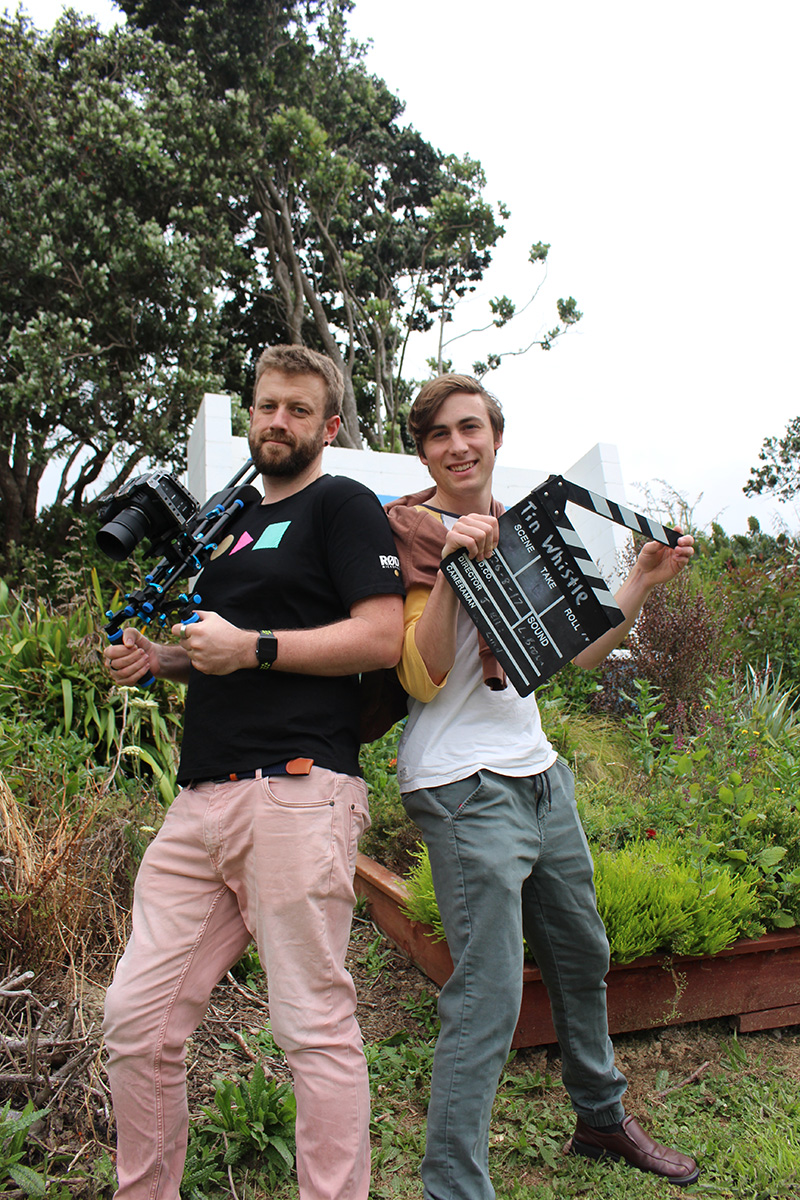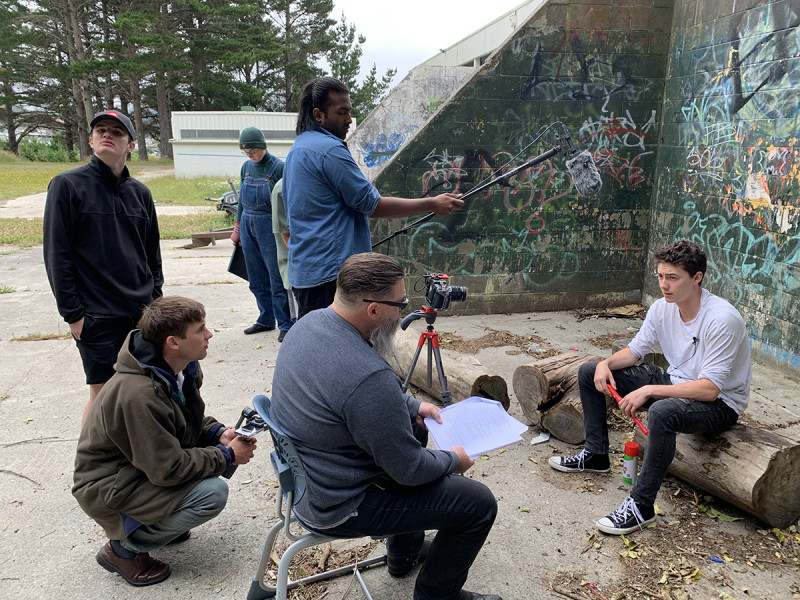

Wellington Silver Screeners: Tin Whistle Collective by Alessia Belsito-Riera
In our new Wellington Silver Screeners series, Alessia Belsito-Riera shines a spotlight on the movers and shakers working in the film capital of New Zealand.
The Tin Whistle Collective started when two film-mad Kiwis, Jason Ellis and Eli Hill, met at the 48Hours filmmaking competition. Within weeks they owned a cinema camera, and within months they had a script for their first feature film. They shot mockumentary Two Idiots and a Tin Whistle in January of 2020, edited it over lockdown, and won several awards at international film festivals. I caught up with Jason and Eli to talk about film, their passion project, and what’s next.
How did you become interested in storytelling and filmmaking?
Jason: Watching The Matrix when it first came out. I remember watching that movie and thinking it would be so cool to make stuff like that. I haven’t made something quite like it just yet, but it’s a work in progress.
Eli: My interest in storytelling came from reading books, and The Lord of the Rings got me interested in film. I guess it’s a natural progression to go from watching films and reading books to wanting to make your own. Things like 48Hours filmmaking competition and YouTube are a great way to get a taste for having people watch your stuff and the reward of having made something yourself.
What do you think is so special about filmmaking?
E: Filmmaking is a combination of multiple media. There are so many fields coming together and that means you can have something really unique. I also like that it’s quite accessible. Reading a book can take a long time and be a bit of a slog at times, whereas film is something that you can show anyone, from a five-year-old to an 80-year-old, and they’ll be able to immerse themselves in it.
J: I think more than other mediums, it’s generally a lot more collaborative.
Tell me about your feature film Two Idiots and a Tin Whistle (2021).
J: You’ve got the good pitch Eli!
E: It’s like America’s Got Talent but the terrible New Zealand small town version. It’s set in Porirua, and it focuses its attention on two warring recorder players as they battle their way through a talent show. It’s a fun ride: comedy, a little bit of drama, a little bit heartwarming… it’s all fun and games until someone loses an eye!
What inspired the story and how did you make it happen?
E: Jason and I met at a 48Hours competition. We had the same interests and similar goals, and one of them was climbing this Mount Everest of making a feature film. We brainstormed a few ideas, and when you really want to do something, your mind subconsciously works to make it reality. I was driving over the Remutaka Hill and I was listening to this CD my mum had given me. On it was the greatest recorder player in the world – supposedly. It was good… but also, you know, it’s the recorder. We started with that idea and wrote a 10-page master plan. It started off with Giovani as the main character and then as it developed, we realised this was possibly the most dislikable protagonist ever. We switched it over to focus the story arc on another character and I think that really worked to our advantage in that we had a really well-developed villain, and it made the whole story better.
We knew Mat Hoyes (music) from the 48Hours competition. He was really keen, and Two Idiots and a Tin Whistle is a musical, so he played a big part. He was teaching at Porirua College and got us the hall in January over school holidays.
J: We managed to somehow luck out and get an awesome cast and crew who really bonded and made the whole shooting experience very smooth and easy and enjoyable.
E: We wrote in few roles that could be filled by people who were more well known, and we made sure that all they would have to commit is a day or even a couple of hours of their time. So we DMed every man, woman, child, and their goat: Jacinda Ardern, a bunch of All Blacks, the Mayor of Porirua, musicians, actors, everyone. Karen O’Leary was gracious enough to come on board and give us a good bit of her time.
Everyone had a great vibe on set, and you know that if someone is laughing while you’re filming then it’s probably going to turn out pretty well for the audience. I think it turned out really well and for a lot of us it was our first project of this scale, in many ways, I think this was an advantage by giving it a raw feeling of fun.
What was it like working within and with the community you live in?
J: It was great. Everyone was super keen. Every time we put out ads for cast and crew we received a lot of responses and everyone that came on board was thrilled to be part of it. Wellington is definitely the filmmaking hub of New Zealand and there are a lot of resources and people keen to be involved.
Two Idiots and a Tin Whistle was done on a micro budget. What does that look like?
J: Most of that went into food [laughs]. Initially we thought we could crew it just the two of us, but we quickly realised that was a stupid idea. It was really about bringing the right people on board who were passionate about it, put their all behind it, and knew from the outset that it wasn’t going to make everyone millions of dollars. We were doing it for the love of filmmaking.
E: Part of it is just making wise decisions and trade-offs between putting money into something like sound, because that really matters, rather than into a robotic T-Rex with flames shooting out its nose. You have to weigh up your choices and make decisions on what’s going to have a bigger effect on the story and on the audience’s experience. But having said that, a smaller crew and a small-scale production lend themselves to going more with the flow. If everyone is able to be in the same room and communicate, you can just do it a lot more off the cuff. Everyone is on the same page, enjoying it at the same time, and there is a much more collaborative feeling.
J: You have a lot more creative freedom, because generally, as soon as you get into the higher budgets, it’s not your money, its someone else’s, and they’ll want to have their say.
What would you do differently next time?
J: As much as I really didn’t enjoy the planning stages, it would have been really helpful in certain scenes if I had spent more time storyboarding. A lot of that stuff we made up on the fly with our DP Max Spink, and most of it works, but there are the occasional moments in which I got stuck in the edit.
What do you think worked well?
J: All of it really! I think the amount of time we spent beforehand in rehearsals with the cast was great. It helped the cast find their characters and that’s where a lot of script suggestions and dialogue changes came from, which I think then led to the shooting going so quickly and smoothly.
E: There is a saying that for a director, by the time the film starts, 80 percent of your work should be done. That means you should be putting the right people in the right places. We managed to luck out and find a bunch of people who were really passionate. Quite a few of them were young and hungry to get something behind their name. I think the story works quite well. It carries you through fairly nicely. It’s got a bit of a roughness to it, but it’s sweet as well. Another thing that worked is that we just did it. You can spend your whole life planning the perfect movie, but ultimately you need to take that next step, put yourself out there, and be prepared to potentially make a turd…
J: But you don’t learn otherwise.
E: Yeah! And we managed to not make a turd.
What’s next?
E: Since Two Idiots and a Tin Whistle we’ve done a stage show and a number of short films. Now we are looking to do another feature. We’re going to take the next one in a more traditional way of shooting, stepping away from the mockumentary format and into a cinematic format. We have a couple things on the go, but the most progressed is a horror comedy called Killer Vacuum.
J: We also have a couple more lower budget ideas we’re playing with and a fair amount of short film ideas floating around as well.
E: We have a few horses in the race, but basically, we are trying to progress everything we can. We have a really good group surrounding us who are passionate about the same thing. We have this human resource of talented people, and it would be a shame not to use it and the passion we all have.
View more articles from:
« Issue 203, August 29, 2023

